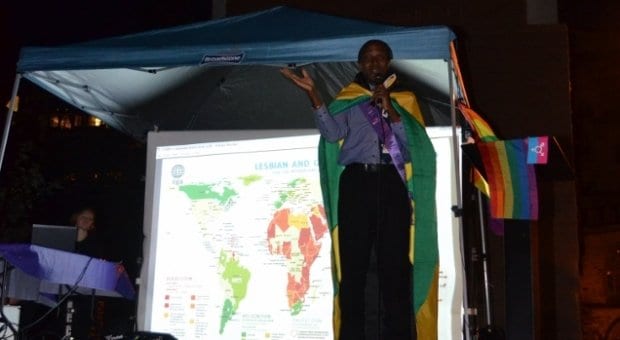Ottawa’s gay community held a vigil for persecuted queer people around the world Aug 22 as part of Capital Pride (CP).
“In the midst of the festivities, we stop to remember those for whom being out and proud also means being constantly afraid,” CP vice-chair of operations Jodie McNamara said. “Tonight we remember those who have bravely stood up to their governments, families and communities in spite of the danger they face for having done so. We also remember those we have lost to the struggle.”
Presented in collaboration with Amnesty International, the vigil also remembered, by name, some of those whose lives have been cut short.
Filmmaker Leslie Foster presented several clips from his documentary Until We Have Faces, in which he and his team travel to Jamaica to address what some must endure in the island nation.
“We spoke with homeless gay street kids. Sitting in one of those interviews with a street kid, I remember holding his hands as he wept quietly and talked to us, and his palms had grooves in them, scars from machete wounds — from the numerous times he’d been attacked for being gay in the streets,” Foster recalled. “I had a passport; I could leave. But there are people there who are fighting so bravely and so amazingly for their right to be bold, be free and be who they are.”
Maurice Tomlinson, CP’s Jamaican-born international grand marshal, said he met with the Jamaican high commissioner to Canada, Sheila Sealy-Monteith, on Aug 22.
Tomlinson said that, as drastic as the concept may be, he is considering supporting a boycott of his homeland, as that is “the only thing the Jamaican government seems to fear.”
“They seem to be impervious. But the potential to impact the economy if Canadians stop visiting Jamaica because of the violations of the rights of LGBT seems to really scare her,” Tomlinson said.
Tomlinson’s husband, Reverend Tom Decker, spoke candidly about how religion plays a part in perpetuating homophobia.
Originally ordained as a priest in a Roman Catholic congregation, Decker said the guilt imposed on him by Catholicism drove him to suicidal thoughts. After distancing himself from religion to survive and heal, Decker found the Metropolitan Community Church, where he slowly left the “toxic shame behind.”
“I realized that being gay and being a person of faith was not a contradiction in terms. God loves all God’s creation in all its magnificent diversity.”
But, Decker said, not everyone will experience the healing power of faith. “They will only hear of rejection and condemnation. They will hear sermons preached against them which will incite others to take those words and turn them into machetes, baseball bats, daggers, guns or, in my case, a shovel. I bear 38 stitches on the crown of my head from a gaybashing when I was only 16 years old. Too many lives have been lost, and it’s got to stop. The world needs to see a different face of God.”
Decker said that evangelical, fundamentalist Christianity is the greatest hurdle to global acceptance of gays.
Amnesty International’s Canadian point-person on LGBT and women’s issues agrees. American evangelical influence is absolutely contributing to hatred against gays, especially in Uganda, Jackie Hansen said.
Amnesty has noticed “a rise in homophobia around the world” and increasing criminalization of same-sex conduct, Hansen said.
The most powerful tool average Canadians possess to fight international homophobia is to show the world they’re watching, Hansen said. “If you show solidarity and you show the world is watching, it makes it harder for there to be arrests and killings. And a lot harder for violence to continue without consequences.”


 Why you can trust Xtra
Why you can trust Xtra


